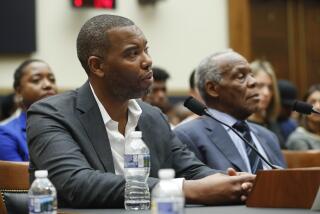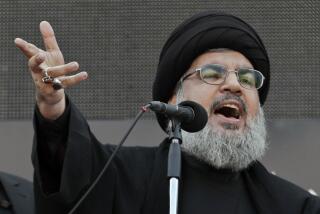A Media-Friendly Firebrand
GAZA CITY -- With his conservative dress, gold-rimmed glasses and cordial smile, Dr. Abdulaziz Rantisi -- a co-founder of the radical Islamic movement Hamas -- doesn’t immediately appear to be an extremist.
He welcomes visitors into his Gaza City apartment and serves sweet Arabic coffee and candy with aplomb.
But Rantisi’s easy manner and fluent English only serve to polish his steely pronouncements on Israel to the world’s media: The Hamas hard-liner thinks it should be destroyed.
On Tuesday, Israel attempted to kill him. Apache helicopters fired several missiles at Rantisi, injuring him and killing two others. Just hours after he was treated for shrapnel wounds, Rantisi was taking extremism to the airwaves from his hospital bed.
“The Jews killed the prophets, and now they’re killing the Palestinian people,” he said in an interview Tuesday with the satellite TV channel Al Jazeera. “We will continue our jihad and our resistance until we throw the last Zionist criminal out of our land.”
Hamas has staged kidnappings, shootings and bombings in Israel and the territories since 1987, killing hundreds of people. In a telephone interview Tuesday, Israeli government spokesman Avi Pazner called Rantisi “an enemy of peace, a well-known terrorist and a danger to men who has poisoned the atmosphere for too long.”
Rantisi, 55, is second in influence in the Hamas movement to Sheik Ahmed Yassin, its spiritual leader. Rantisi has insisted that he is only a political representative of Hamas and has no dealings with its armed wing. But Pazner said Israel had intelligence that linked Rantisi to Palestinian attacks Sunday that killed four Israeli soldiers.
Pazner also said Israel was privy to recent Hamas deliberations in which Rantisi proved himself an “obstacle to peace.”
“There was a discussion within Hamas last week whether or not to accept the cease-fire sponsored by the Palestinian prime minister,” Pazner said. “Rantisi and his group prevailed in convincing the others that there should be no cease-fire and that the terror should go on.”
At his Gaza City apartment recently, Rantisi discussed Israel’s demands that Palestinian Authority Prime Minister Mahmoud Abbas disarm Hamas and other militant groups to force an end to attacks against Israelis. Rantisi laughed derisively.
“So the Israelis say, ‘You don’t use more than stones against us and we’ll use F-16s.’ Who can accept that?”
He said at the time that Hamas was considering Abbas’ cease-fire request. Rantisi said the group understood that Abbas was being squeezed by Israel and Washington.
But days later, Rantisi vowed to continue the group’s assaults “until the liberation of the last centimeter of the land of Palestine.”
The fourth of 12 children, Rantisi was born in 1947 in what would become the Israeli town of Yavne. When the Jewish state was established months later, his family fled to a refugee camp in the Gaza Strip called Khan Yunis. Eventually he left to study medicine in Alexandria, Egypt. The experience was a crucible for Rantisi’s Islamic radicalism.
There he joined the Muslim Brotherhood, a burgeoning fundamentalist Islamic movement that swept through the Middle East in the 1960s and 1970s, countering secularist tendencies of the time. Members of the Muslim Brotherhood went on to form other radical and violent groups, such as Islamic Jihad and Gamaa al Islamiya.
On his return to Gaza, Rantisi worked as a pediatrician at the hospital in Khan Yunis and in 1987 founded Hamas with five other men. The next year, Rantisi served his first major prison sentence, and upon his release in 1991 he and 415 other Palestinian militants were to be exiled to Lebanon.
Rantisi took charge of the group, which included leaders of Islamic Jihad and other extremist organizations, and persuaded them to refuse to cross into Lebanon. He argued that doing so would encourage Israel to exile others. Instead, the group camped for two years in the buffer territory along the Israeli-Lebanese border.
Rantisi’s cutting diatribes against Israel drew media interest, and he became internationally known as a spokesman for the group. He also became one of the harshest critics of nascent peace talks between the Palestine Liberation Organization’s Yasser Arafat and Israeli Prime Minister Yitzhak Rabin.
By 1993, international pressure mounted to allow the exiles to return to Israel, and the government finally relented. Rantisi went straight back to jail for more than three years, but other exiles spearheaded new attacks.
He has also become known internationally as an Islamic firebrand. Rantisi called for Muslims to rise up in defiance of the U.S. invasion of Iraq.
“We call on the Arabs and Muslims to burn the land under the feet of the American invaders,” he said in January. “Especially our brothers in Saudi Arabia, because this war is not against Iraq, it’s against the Islamic nation.”
Times staff writer Rebecca Trounson, recently on assignment in Gaza City, contributed to this report.
More to Read
Sign up for Essential California
The most important California stories and recommendations in your inbox every morning.
You may occasionally receive promotional content from the Los Angeles Times.










